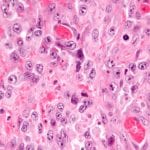Mesothelioma Tumors Thrive in Low Oxygen Environment
 South Korean researchers have uncovered a clue that might help explain why mesothelioma tumors are so aggressive — and what can be done to counter that aggression.
South Korean researchers have uncovered a clue that might help explain why mesothelioma tumors are so aggressive — and what can be done to counter that aggression.
The new study centers on hypoxia, a deficiency in the amount of oxygen reaching the tissues. It is a hallmark of many types of solid tumors and it turns out that malignant mesothelioma tumors are no exception.
Patients with these hypoxic tumors tend to worsen quickly, be less responsive to treatment, and end up with poor outcomes.
The Effect of Oxygen on Malignant Mesothelioma
Scientists in the Laboratory of Clinical Pathology, College of Veterinary Medicine, Seoul National University are trying to better understand how hypoxia effects human malignant mesothelioma cells and exactly what that means for patients.
They incubated malignant mesothelioma cells in an air chamber and noted what kinds of changes happened when the amount of oxygen was steadily decreased.
Specifically, the team measured the effect of hypoxia on the signaling pathways that control mesothelioma cells’ ability to replicate, resist certain drugs, and migrate to other parts of the body to form new tumors.
Hypoxia Makes Mesothelioma Cells Stronger
The new study, published in BMC Cancer, revealed that hypoxia actually protects mesothelioma tumors and helps them grow and spread.
Among other things, hypoxic conditions were found to:
- Increase the clonogenicity, or ability to clone themselves. of malignant mesothelioma cells
- Increase the amount of CD44, a cell surface protein involved in mesothelioma metastasis
- Enhance mesothelioma cells’ ability to resist cisplatin, a primary component of mesothelioma chemotherapy
- Increase the mobility and invasiveness of mesothelioma cells
Hypoxia also negatively impacted the Bax/Bcl-2 ratio, which regulates apoptosis (programmed cell death), affecting the progression and aggressiveness of mesothelioma tumors.
Could Flooding Tumors with Oxygen Enhance Mesothelioma Treatment?
“The data illustrated that hypoxic conditions augmented the aggressive phenotypes of human malignant mesothelioma cells at the biological and molecular levels,” writes lead author Myung-Chul Kim.
Dr. Kim and his colleagues say this improved understanding of mesothelioma tumor aggressiveness could open the door for new and more-effective mesothelioma treatment approaches — approaches that include oxygen as a support tool.
“The present study provides valuable background information…suggesting that a control measure for tumor hypoxia may be an effective therapeutic strategy to reduce the aggressiveness of cancer cells in human malignant mesothelioma patients,” the report concludes.
Currently, fewer than four in ten patients treated with the gold standard mesothelioma chemotherapy combination of cisplatin and pemetrexed (Alimta) respond to the treatment.
Source:
Kim, MC, “Hypoxia promotes acquisition of aggressive phenotypes in human malignant mesothelioma”, BMC Cancer, August 15, 2018, p. 819





